Saturday Feb 21, 2026
Saturday Feb 21, 2026
Wednesday, 24 November 2021 00:00 - - {{hitsCtrl.values.hits}}
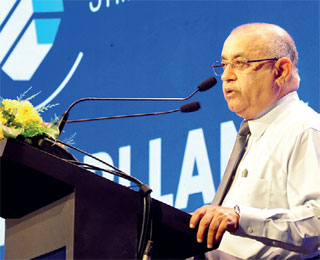
Keynote Speaker Secretary to the President Dr. P.B. Jayasundara
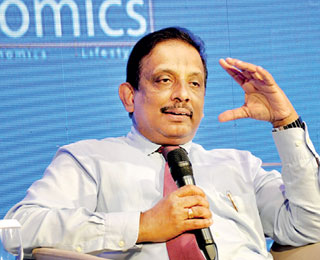
Treasury Secretary S.R. Attygalle
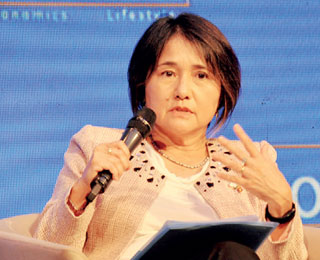
World Bank Sri Lanka Country Manager Chiyo Kanda
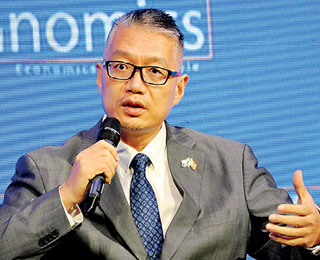
ADB Sri Lanka Country Director Chen Chen
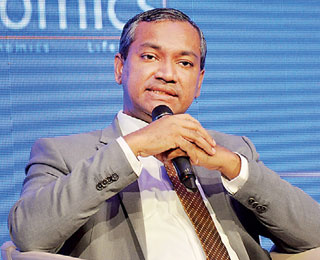
ICTA Chairman Oshada Senanayake
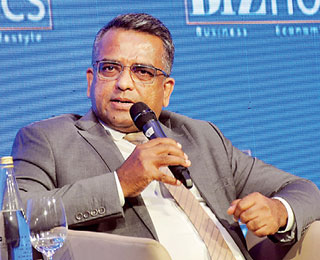
Sri Lanka Apparel Brands Association Chairman Lalantha Watudura

By Darshana Abayasingha
Secretary to the President Dr. P. B. Jayasundera recently said Sri Lanka aims to have a zero budget deficit by 2027. Spelling out a 14-step strategy, Dr. Jayasundera said in 2022 the Sri Lankan Government hoped to reduce the deficit to 8.8%, then 4.5% the following year, whilst growing revenue to the State; not with taxation, but by controlling expenditure and generating new revenue measures.
“If a company ran 70 years like this, it would have gone bankrupt. But this country has survived. Is it on a sustainable fiscal path? No. The Finance Minister has done a great thing by recognising this in Parliament and in public, and he has put a plan in place to bring the deficit to zero. The key to this is to control expenditure; put expenditure to the capital side and not consumption,” Dr. Jayasundera said.
A former Treasury Secretary, Dr. Jayasundera, was speaking in Colombo this week at a forum on the future of the Sri Lankan economy, organised by BIZnomics Magazine at its biannual development dialogue titled the Colombo Development Symposium.
A multi-pronged approach
Elaborating on 14 steps taken by the Government to achieve its target for 2027, Dr. Jayasundera said it will first do away with the annual warrant practice, whereby Parliament approves a budget and ministries casually spend that sum on an annual basis. This would be replaced with a quarterly warrant administered by the Treasury. This would redefine procurement, hiring and project commitment processes in State institutions, he added.
“Next, no matter how much we tried there is no commitment control, and as a result the budget runs on to arrears. Nobody can prevent it because the Treasury is unaware of spending, even Ministry secretaries. But the Ministry and its agencies have committed. Contracts have been awarded and signed. No checks and balances. So, the next step is commitment control; strictly according to financial regulations. The third one is phasing out fiscal support, particularly operational support for State enterprises. They are running very comfortably and only the Chairman and the Board looks at the Budget and life goes on with no control elsewhere. They must learn to look at revenue and expenditure and improve performance. Also, the Secretary to the Treasury must within two weeks submit to Parliament all amendments to the Appropriation Bill, which is being debated in Parliament, preventing supplementary budgets this year. Which means this is all, manage it! That is the discipline,” Dr. Jayasundera said.
Firing up SOE functions
He also pointed to the need to enhance utilisation of underperforming state assets, stressing that utilisation is key for countries with limited resources. In addition, there will be a reduction in Government expenditure on fuel, electricity, communications and other goods and services. The extension of retirement age by five years is partly to retain the wealth of human resources within the sector, whilst this would also generate savings of nearly Rs. 25 billion on pensions and gratuity.
The Secretary to the President pointed to the move towards a structured wage policy for the public sector amidst the lack of wage increases this year, and the establishment of an integrated results-based management system of projects. Steps have also been taken to enhance the strength of rural household economies through recognised finance schemes. There is no proper development bank in the country, or institutions that can lend capital for start-ups. Such focused institutions are essential to fuel a recovery, he noted. State media institutions have also been directed to take up a business focus and compete aggressively with other channels in the country.
He added, that COVID-19 exposed how every aspect of our economy and society is integrated, pointing to the pandemic’s impacts on tourism, foreign employment, investment, etc., asserting the Government has focused a lot of effort and resources on vaccinating every citizen, with a third booster dose rolled out at present. Government is running an 11% deficit due to COVID-related expenditure and related public expenditure and disruptions that will have to be brought down, he said.
Tax essentials
Revenue is essential to supplement the efforts and the Government is taking a radical approach through a simplified system of tax. It is crucial not to change trust in tax systems, he said, and scrapped taxes that created inefficiencies. Incentives have been given to IT, agriculture, livestock and fisheries; they have been protected. Export taxes and construction sector taxes are down. The Government is committed to continue this system.
“Taxation has to be from people who can afford it, that’s the focus of the 2022 tax policy; 80% of this country’s revenue comes from 20% of taxpayers. Large taxpayers. That’s the focus. So, let's collect from that segment. Why waste time on the other 80%? That’s the simple approach. That 80% is not 100%. For that the minister is proposing to consolidate the large taxpaying segment within the income tax department. Last year’s work was slowed down because of the COVID disruption to officials. Modern tax systems have to happen. The Government introduced a revenue administration management information system to bring revenue on technology-based management, not people-based administration. This should be in operation before April next year. Why should people manage tax administration manually when the world has shifted to technology? Then there are reports that non-collected revenue in this country is 1.5% of GDP. That is approximately Rs. 200 billion. That has to be collected and technology will take care of this arrangement as well. The Budget has provisions to use tax or extra revenue from liquor, tobacco which will eventually become part of the special goods and services tax as well as a few other products coming in.”
Revenue holds the key
A single window for Customs is also being pursued aggressively for transformation of the Department, but there is a lot of work to be done in this aspect. An auctioning system of telecommunication licenses is also being looked at as these are effective revenue measures, the Secretary noted. Right now, licenses are being given with little revenue coming in, he lamented.
Commenting on VAT on the financial services sector, which was increased to 18%, he said this one-off tax is on those who can afford to pay it as the real economy is in trouble, “and they are not looking at it. It's the banks who make money and banks should pay tax.”
Accordingly, the Government is doubling its revenue effort, and technology is brought in to ensure better discipline. He pointed to Pakistan, where leakages were prevented using technology for tax administration. “I will not underestimate the challenges, but this has to happen.”
With recurrent expenditure at 17% of GDP and revenue at 9%, the Government’s current account sits in a deficit. The Secretary said the Government hopes to deliver an additional 3% in savings from the revenue and operational measure proposed in the Budget, as the proposals turn towards delivering savings. “There is no point asking people to save, unless the Government saves,” he said.
They should not collect revenue and run a deficit. They should collect revenue and save part of it too. Currently public investment is only 3% of GDP despite all the work being done, and the country needs at least 6% of public investment to get the real economy going, Dr. Jayasundera said. Bilateral debt is also not cheap, and President Rajapaksa has taken a position that financed projects must be replaced by investment.
“The Finance Minister has also thought in detail about external accounts. That’s the total national budget. We export one dollar, import two dollars. That equation has to be changed, and it is being addressed. Our aim is to put the external account on a sustainable path. We must have our own reserve, not a borrowed reserve. So, the aim this year is to generate $ 12 billion in exports. It’s a remarkable achievement. Our idea is to bring this to $ 15 billion by 2024 and $ 19 billion in 2027.”
“I’m glad that every single specific aspect has been identified, addressed and relevant measures taken, and very soon we will be working with several parties with a Special Finance Act giving legal status to what we are talking about. We are also very serious about transforming the real economy and national production in this country. The 70-year independent economy is more integrated to the rest of the world, and there is hardly anything in the local economy. The President asked local manufacturers ‘why are you people investing in Africa and other countries, in renewable energy and facilities; why not here? That is because that 70-year journey was not right. Our people have the capacity – they can invest here, and for that investment protection has to happen in a credible manner, so this is why this Budget has addressed some of those difficult challenges,” Dr. Jayasundera said.
The right facilitation
The Minister is also immediately addressing supply side constraints. It’s not demand decides price now, it’s supply that decides the price situation, he added. This is a Budget that honours commitments, Dr. Jayasundera stressed. Tax policy unchanged. “Debt servicing honoured – give a bad rating, but take the debt payment back.”
Non-debt creating public investment. Government to be a facilitator. Countries have at least this scale of activity despite COVID, risks are there but the lessons will help us do much better than many other countries. The fight against drug trade is also ongoing. This fight has also without much publicity going on, and it has been lessened significantly.
“Corruption is another fight and it is still there. It has not even begun, and it is difficult. Creating a corrupt free society is not only a responsibility of the Government, it is also the responsibility of the private sector. You also motivate them. Pay taxes instead of paying anything else. Pay the 25% surcharge – that’s good, because the country needs it and a corruption-free environment.”
The keynote speech by Dr. P. B. Jayasundera was followed by a panel discussion, featuring the Treasury Secretary, heads of the World Bank and the Asian Development Bank, ICTA Chairman and the Sri Lanka Apparel Brands Association.
Path to progress
Asked how the World Bank will support the Government’s measure to develop infrastructure to boost productivity in the country, Country Director Chiyo Kanda said her agency has provided constant support to Sri Lanka for infrastructure development, and building capacity and training for skills development. Kanda said the Government in its Budget has laid down the pathway to improve fiscal sustainability over the next few years, which is a positive direction.
“For Sri Lanka to really unlock its potential, I think it is important for the private sector to come in with investment, and for that the investment climate needs to be healthy. Also look at shifting to new energies from being carbon-based, and make digital technology much more available and affordable to all. Skills development is essential to support the mentioned efforts,” she said.
Kanda’s sentiments were echoed by ADB Country Director Chen Chen, who described the budget as “a very sobering one”, and found it very encouraging that it spells the future direction. However, a lot must happen to achieve its targets, and the “country will need a new generation of good talent to achieve the goals in different sectors”. Chen stressed the need to develop relevant skills to match job requirements, pointing to disparities with the skills of local graduates. There must be better communication of required skills and competencies to secure a job in modern markets, he said.
Human resource focus
Joining the discussion, Treasury Secretary S.R. Attygalle, detailed the Government’s continuous effort to build capacity for its development journey. Attygalle explained extended support has been lent to boost exports, providing greater ease for operations. Major reforms are being enacted with regulations for imports and exports with over 400 para-tariffs removed, and opening up a single window for clearances. On the fiscal side, Attygalle stressed on efforts to reduce the budget deficit to 4.5% by 2025, and transform the trading economy into a production economy. “The path we envisage is spelt out in the Budget.”
“There must be improvements in the procurement sector, there are many issues with procurement deals. There must be big reform in that sector, which will become transparent and quicker. Great emphasis has been given to vocational training. There are over 200,000 students that pass out from Advanced Levels who don’t gain access to university. So, skills development is important and a lot of activity is being identified and rolled out to empower these segments. The World Bank and the ADB is supporting efforts to help these graduates become employable. There will be a lot of emphasis on human resource development,” Attygalle explained.
Technology the enabler
ICTA Chairperson Oshada Senanayake added it was imperative to stabilise tax policy and welcomed efforts in the budget to maintain a sustainable policy over the medium term. He stressed on the importance of growing telecommunication infrastructure to support accelerated development, adding that sustainable policy would help investments into this arena. He also detailed ongoing efforts to support the Government’s ambition to automate functions by the middle of next year.
“There are many aspects we need to completely automate. Rather than building these solutions ourselves, we are trying to engage and enable the ICT industry to do this for us. In the process, create local software products that could go out to the world. We are creating a good reference point for them in our own backyard. We can help them mature these products, which they can then take out to the world. Sri Lanka is identified as a fantastic destination for technological services, this has been reported worldwide. So, we need to enable the industry and help them to walk with us rather than compete with us.”
“Many countries are taking a cloud-based approach, so we need to change our approach and leverage these technologies and industries and what they offer. We have two or three data centres here that are very strong, and we are connected via a strong submarine cable ecosystem. We need to utilise these infrastructures better. So, enable and engage with industry and understand the capacity to empower the public sector. This must be in a sustainable environment. The issue is not technology here, but creating the governance-based environment. The Cyber Security Act, Data Protection Act is coming, we are looking at a much more holistic approach,” Senanayake said.
Developing home skills
Sri Lanka Apparel Brands Association Chairman Lalantha Watadura underscored the need to focus more on local brands and talents and build Sri Lanka as a fashion destination. Pointing to the Indian market, he said the sub-continent was weak in synthetic fabric manufacturing, and that Sri Lankan industry must capitalise on such opportunities and look to service Middle Eastern and European segments thereon. The industry and Government together must give greater impetus to local talent, as the focus all this while has been on servicing international brands and neglected national talents and brands, he said.
“Sri Lanka is known as a good apparel manufacturing hub for international brands. We could probably add another $ 5 billion in another 10 years by making Sri Lanka a fashion destination. This would be good for the local SME sector as well, as that way manufacturers can create their own products with no pressure on costs from someone else.”
Commenting on the Government’s focus on developing renewable energy, ADB Country Director Chen Chen described the target of 70% by 2030 as ambitious but laudable, and stressed the need to develop generation capacity and sources. It will require a supporting policy framework that will give confidence to investors on stable revenues from generation. Chen pointed to several projects the ADB is engaged in with Indonesia, Vietnam and the Philippines and said his agency would be happy to share those learnings with Government and stakeholders.
The World Bank Country Representative Chiyo Kanda, also underlined the need for active participation from the private sector alongside the public sector for renewable energy generation, adding that a conducive investment climate must be created to boost activity within that sphere. “There are concessionary resources that can be made available. But bringing in private capital would be good,” she said.